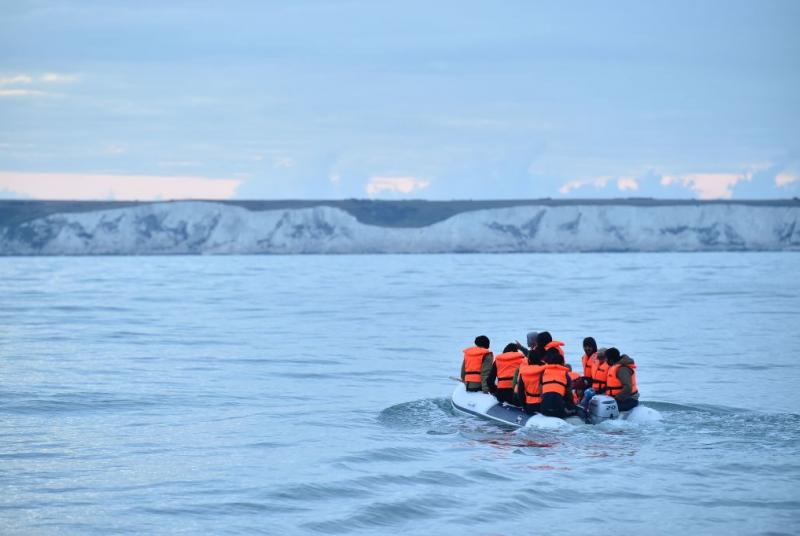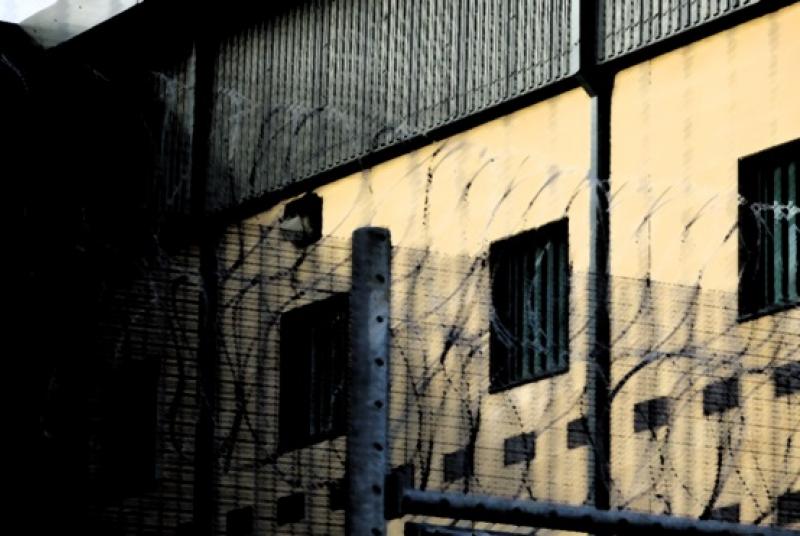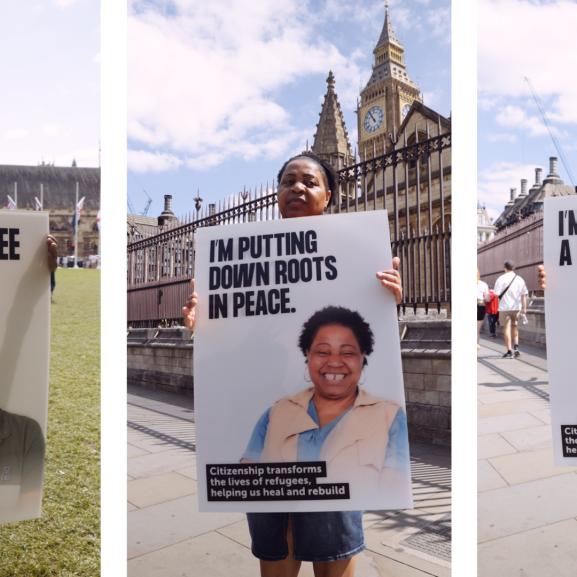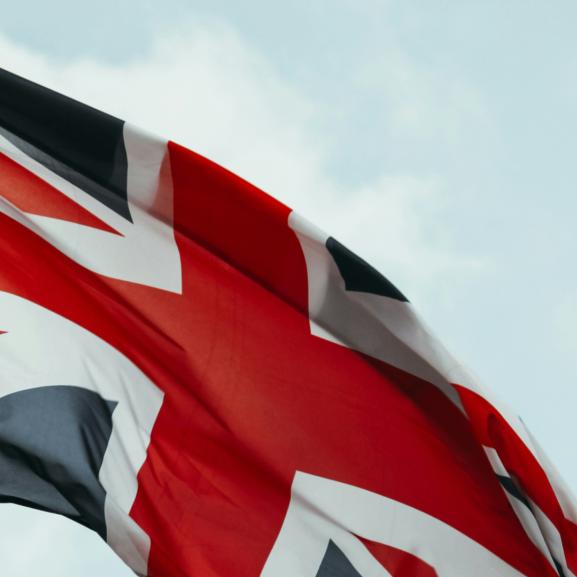Everything you need to know about Priti Patel’s Anti-Refugee Bill
Priti Patel’s "Nationality & Borders Bill" (AKA the anti-refugee bill) could be the biggest overhaul that our asylum system has seen in decades. Here’s everything you need to know about her cruel & inhumane plans for people seeking asylum.
Overview of the anti-refugee bill
- The most dangerous part of the proposals are that someone’s means of arrival will determine how worthy they are of protection in the UK
- Asylum seekers arriving through anything other than resettlement will receive a lesser form of protection, including temporary status, no access to financial support, and limited rights to family reunion. Recognised refugees will live in constant fear of return to persecution or death at any moment
- Even in the face of strong opposition, Priti Patel would like to export people to offshore prison-like facilities while they wait for a decision on their asylum claim
- The proposals have faced criticism, including from UNHCR, for containing inaccuracies, for misrepresenting the UK’s obligations under international law and for weakening the protection available for people fleeing torture and persecution
Why have we called Priti Patel's Nationality & Borders Bill the anti-refugee bill?
Because it's inherently anti-refugee. If the bill passes, it will punish many people fleeing from war and persecution for trying to seek safety here.
It could mean that people seeking safety are sent to off-shore camps, stripped of their rights to claim asylum & may mean they can never see their families again.
Read on to find out more.
It would breach the Refugee Convention
The 1951 Refugee Convention protects people seeking asylum from persecution on the grounds of their method of entry and guarantees them access to claim asylum, for the very reason that there is no viable way of seeking permission to enter a country in order to apply for asylum.
Under the anti-refugee bill, Priti Patel wants to criminalise people who attempt or manage to reach the UK irregularly. But people seeking safety often have to travel without permission. If you arrive in the UK irregularly, you might have arrived via a small boat or with a fake passport to enter the country as there is no visa to enable you to come to the UK to claim asylum.
The new proposals claim to introduce tougher penalties for those arriving or seeking to arrive, in the UK without permission. In actual fact, these powers already exist but are rarely used against those seeking asylum because to do so would be a breach of international law.
The Government also proposes to intercept boats attempting to cross the Channel and suspected of carrying passengers who seek to enter the UK without permission, by literally turning boats around and redirecting them away from the UK.
To suggest that we will now criminalise asylum seekers or turn their boats around because they had no choice but to seek entry to the UK without permission is both morally wrong and unlawful.
Many of the people we work with had to arrive in the UK irregularly, as there is no visa for claiming asylum.
This Government proposes to improve a discretionary route to protection so that people can submit an asylum claim to the UK while still in their country of origin, in exceptional circumstances. This power, little used at present, is never likely to provide safety to any more than a handful of refugees due to the extreme risks and logistical difficulties of seeking entry permission from a UK embassy when your life is at immediate risk.

Third country cases
If the Government believes that someone seeking asylum in the UK has travelled through, or has a connection to, another safe country, then under these proposals, the UK would not have to consider their asylum claim at all.
They could even seek to remove the person as quickly as possible to that safe third country to have their claim for protection considered there.
The concept of a ‘safe third country' is not new and, as a member of the European Union, the UK was able to return people to EU states under the Dublin Regulation. Since leaving the EU we have lost both the means of evidencing someone’s passage through an EU country and the readmission agreement required to effect their return to that country. As a result, and in the absence of any current readmission agreements with any safe third countries, these proposals are entirely unworkable.
In fact, these proposals will mean that people’s asylum claims take even longer to process as it introduces a six-month delay while the Government tries to prove a link to a safe third country and to secure a readmission agreement. It is most likely that they will fail to achieve either objective and so will have to consider the claim in the UK anyway, but only after having subjected the person concerned to an unnecessary and retraumatising delay.

A two-tier system
In cases where someone has reached the UK via a safe third country but cannot be removed to have their claim for protection considered in that or another safe third country, these proposals will allow such individuals access to the UK asylum process, and should their claim for protection be successful they will be granted a temporary protection status.
This status, bestowed on them because of the irregular means of their arrival and not at all related to their need for protection, is far inferior to and less protective than the refugee status that is currently given to people whose claim for protection is successful.
They will:
- lose access to welfare benefits (subject to a destitution test)
- have restricted rights to family reunion
- and have no automatic right to settlement in the UK.
Bestowing a temporary and second class status on refugees not because their need for protection is any less urgent or compelling, but purely because they were obliged to travel irregularly and to arrive without authorisation, is cruel and unjustified.
The people affected will live in a state of perpetual anxiety, never knowing whether they will be returned to persecution or death. This will prevent their integration in local communities, hamper their rehabilitation and recovery, divide families and condemn vulnerable people to poverty and insecurity within the UK.
Offshore processing(/prisons)
Priti Patel wants to amend the rules to make it possible to move asylum seekers from the UK to another country while their asylum claim or appeal is pending. This will keep the option open to develop the capacity for offshore asylum processing facilities, which would effectively act as off-shore prisons.
The idea is clearly inspired by the infamous and widely criticised offshore detention centres used by the Australian Government on the islands of Nauru and Manus. The Australian model resulted in death, lasting physical and mental health damage, human rights violations, child and sexual abuse, and a considerable cost to the public purse. It is a model that does not work.
As it stands, the UK Government has no agreements with other countries for such plans to be put in place.
Let’s hope it stays that way.

This government wants you to believe that people seeking asylum and their legal representatives are playing the system
The anti-refugee bill seeks to introduce a ‘Good Faith’ requirement which obliges people seeking asylum, and their representatives to ‘act in good faith’ at all times. It’s not really clear what this means but can be summarised as bringing all information forward as soon as possible, telling the truth and leaving the UK when the claim is refused. Failure to do so will impact on whether the individual’s claim or testimony can be believed by either the Government or the courts.
There is nothing new in this proposal: legal representatives are bound by a stringent code of conduct and the claimant’s behaviour can already be taken into consideration as part of the credibility assessment.
What this proposal does do is seek to legitimise the idea that people seeking asylum and their legal representatives are telling lies.
When taken alongside new proposals to employ ‘scientific technology’ (such as bone scanners) to dispute the age of the child seeking asylum, these proposals resurrect a poisonous and unfounded notion of rampant abuse of the process.
One-stop process & fast track appeals
Under the anti-refugee bill Priti Patel wants to establish a one-stop process so that asylum, human rights claims and any other protection matters are made early and considered together.
Very little weight will be given to any evidence, such as an expert medical report, that is presented later in the process, as is often the case for profoundly traumatised people who find it hard to disclose sensitive information early. The Government plans to bring in a fast track appeal process for claims that are considered ‘manifestly unfounded’ or made just prior to removal. Asylum claims and appeals made in detention will be subject to an accelerated procedure, potentially resurrecting the Detained Fast Track - found to be unlawful in 2015.
Let’s put all of this into perspective. In our 2019 report, Lessons Not Learned, we found that ⅖ of asylum refusals are corrected on appeal. The appeal success rate has been steadily increasing over the last decade and has been around 40% for the last two years.
This means that the asylum appeal process is vital, as the Government often gets the decision wrong the first time.
There is also considerable evidence showing that late disclosure of information during the asylum process is common in those who have suffered trauma.
There is a real risk that a "one-stop" process will penalise those who have experienced trauma, like survivors of torture, who need more time to process what has happened to them and to build trust before they feel safe to disclose their experience.
Without a well-funded system of legal advice for people seeking asylum these proposals will only lead to the UK wrongly refusing those with a well-founded claim for protection. Legal aid funding has been slashed further and further over the past decade and we know from our research with survivors of torture how hard it can be to access good quality legal advice at the beginning of the process.
More support for “legal advice”
The Government proposes to provide more generous access to advice, including legal advice, so that all claims and related evidence can be provided as early as possible.
Though at a surface level this sounds like it could be a good thing, the fact that they’ve said ‘legal advice’ as opposed to legal aid could mean that such legal advice is outsourced to private companies or set at a level too basic to deal with complex asylum matters. This would likely result in more last-minute legal action, delivering the opposite outcome to that which Priti Patel claims to be committed.
Destitution and removal
The anti-refugee bill proposes a range of measures to facilitate the removal of refused asylum seekers and other migrants. Among these is the use of destitution as an incentive to encourage people to leave once their claim has been refused.
The proposals resuscitate measures within the 2016 Immigration Act which would remove support currently provided to destitute refused asylum seekers.
Refused asylum seekers living on £5 a day already live far beyond the poverty line and have no right to work. Stripping people of that minimal financial support and pushing them into destitution and street homelessness will have seriously damaging effects on the safety, stability and physical and mental health of this already extremely vulnerable population.
Dr Juliet Cohen, our Head of Doctors, wrote recently in the Metro of a torture survivor who committed suicide because he believed when he was contacted by the Government, that he was going to be removed from the country.
It turned out, the man was due to be informed that his asylum claim had been successful. But it was too late, the fear of return to persecution had been too much to bear.
Survivors of torture already live in fear of being returned to persecution or death. The anti-refugee bill will only make this worse.
Medico-legal reports (MLRs)
When a person is claiming asylum in the UK, they’re invited to provide evidence to support their claim. So, for example, if someone has been tortured, they might be assessed by a doctor who will document evidence of torture, whether physical or psychological.
At the moment, people seeking asylum empower their legal representative to choose and instruct independent experts, including those working for Freedom from Torture, to provide such assessments.
Under the new proposals, that choice would be taken away from people seeking safety as the Government wants to either put in place a panel of pre-approved experts to write these reports or require experts to be jointly agreed by both the claimant and the Government.
In effect, the Government would have the power to veto any independent report writer that they do not approve of - perhaps because they write persuasive reports - and control who can examine a vulnerable and traumatised individual.
A pre-approved panel of experts would necessarily limit the number of report writers available and so restrict access to a vital source of evidence to prove a claim for asylum.
Yet again, the Government has fabricated a problem by questioning the independence and objectivity of independent, expert medical report writers. There is already extensive guidance to establish expertise and to hold expert witnesses to account, and no evidence of abuse of the process to justify such a drastic solution. This is an attempt to discredit and undermine the authority and independence of doctors who are bound by the courts and their own professional bodies to be honest, trustworthy, objective and impartial. At best, these proposals will build further delay into the system. At worst they will deny access to justice for people in desperate need of protection.
Conclusion
What’s clear from these proposals is that Priti Patel’s anti refugee bill is cruel, inhumane and deeply flawed.
In many instances, her plans to boot asylum seekers out of the country will actually just lead to a greater number of vulnerable people living in limbo, in constant fear of removal to persecution and enduring unbearable hardship and exclusion.
Her attempts to build a wall around the UK and deny access to our asylum system will not deter desperate people, driven only by the need to secure safety for themselves and their families.
These plans are cruel, unworkable and unjustified. Priti Patel is using people seeking asylum for political point-scoring - and lives will be put at risk.
It’s more important than ever to make a stand against the mistreatment of some of the most vulnerable members of our society. It’s never been more important to say, REFUGEES WELCOME!






